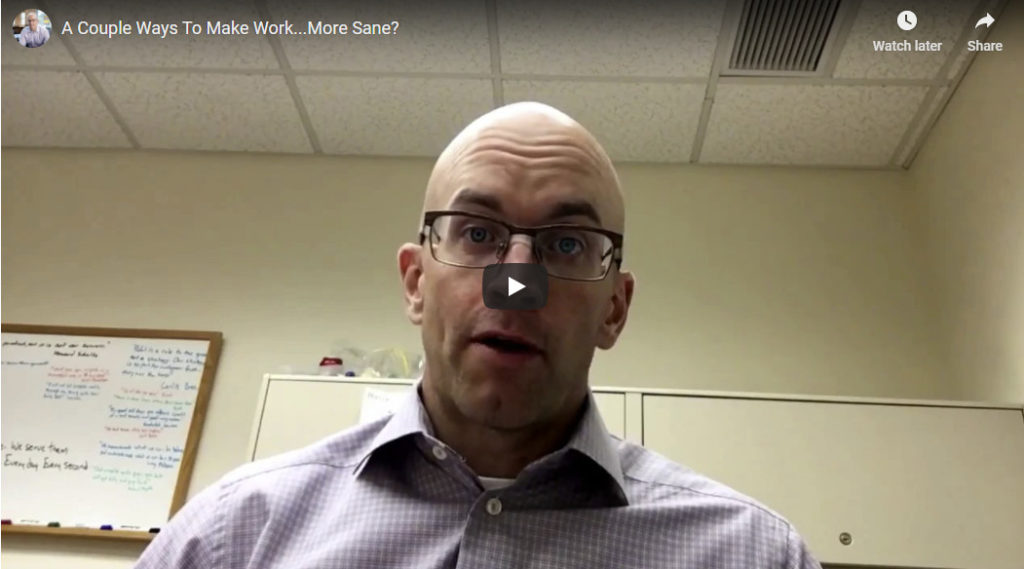How I dealt with a recent failure…
I wanted to hide.
I wanted to get away, or be anywhere but there.
“There” was earlier this month at our golf club’s “Invitational Tournament.” I was playing with a friend. Like everyone else, I wanted to play my best at this event.
But, as the event approached, I noticed a twitch in my hands. This soon began affecting my “pitch” shots. Suddenly, I noticed my hands jabbing at normal shots that required any sort of “touch.” The worst part about it was I could not stop it. In fact, the more I tried, the worse it got. (A lesson all too familiar to those of us who golf!).
Friday featured 27 holes. On the first hole, I hit a good drive, but chunked an easy wedge to the green. Here it comes, I thought…But, I was able to hit a good shot to the green, make the putt, and win the hole. I was convinced that I had gotten past this ordeal!
If only.
The next 26 holes were excruciating. When I missed greens, and I missed more than I hit, I had no “touch.” While my score was ok the middle 9 holes–when my short game was never tested–I knew the issue was still lingering, even toying with my consciousness. I felt off overall. Feelings of nervousness and anxiety abounded. And it began affecting everything. On the second hole, I lost a tee shot right out of bounds–something I rarely do. Then it came…. To golfers, the word starts with a “Y” and I am not writing it here. Call it superstition, but a golfer is never going to write a certain “Y” word.
The worst part, and why I just wanted to dig a hole and hide, is that golf is public. I felt I was letting my partner down (he’s too kind to ever be anything but supportive, so this was my issue). Moreover, I was doing this in front of a peer (our opponent) that I had not seen in about 20 years. What would he think? My thoughts imagined that he must think that I am pathetic. That my game stinks. That I am lousy at everything. Of course, he is also too nice to think such things.
I am always harder on myself than others are. Can you relate to that?
Embarrassing. That’s the word that continued to echo through my mind that day. I probably heard it inside my mind 948 times.
Ok, maybe it was only 594 times. I lost count.
Fast forward to that night. I could not sleep. My mind told me that even that was “embarrassing.”
We did have another 18 the next day. So, I got out of bed and prayed. If this sounds weird, hang on for a second. It is probably not what you think. Here is what I prayed for: I prayed that God would help me stop focusing on myself. Fear always leads me to self-centered thoughts. Not only was I a lousy host to my partner that day, I had failed to ask our opponents any meaningful questions throughout the day. So, I began by acknowledging this and asking for forgiveness. I also asked for strength to repent (this is a word that is religious, but easy to understand. Think of it being what you do when you turn your car around when you are lost and driving to the accurate location–the turning around is repenting). I asked for perspective. This is only golf after all! I also prayed that I would have the strength to be okay with whatever came the next day. I also reminded myself of these truths — Life is more than performance. God’s word reminds me that my identity is not tied to me. It is not tied to work, performance, or satisfying my ego. In fact, I am called to lay down my life (all of it, but especially my own self-interests) and follow Him so that I can fully love others as I want to be loved myself.
I was doing none of that…
So, as I closed my prayer time, I thanked God–as hard as this was to do in the moment–for allowing me to experience these failures publicly so that I could be re-centered on what really mattered.
Failure often does this for me.
I also thanked Him for the things that mattered most in my life (note, my golf game did not make that “cut”).
Contrary to my thoughts the day prior, the sun did come up the next morning. I began my pre-round practice session by hitting what felt like 20 ground balls at, not on, the chipping green. I told my partner that I needed to go to a psyche ward. And then I did something unintentional, but what ended up being strategic: I laughed about it.
When was the last time you laughed off your own insecurity or fear?
Back to me one last time. After laughing, I gave in and tried a new grip. Finally, I began hitting some good shots. I then told myself that I was going to focus on the only thing I could control that day: my attitude.
Maybe my grin is cheesy, but I committed to smiling more that day.
I wish I could tell you that my partner and I made a dramatic comeback and won the tournament later that day. We did not.
However, I played much better. I even hit several good “pitch” shots.
Most importantly, I got out of my self and had a good time with my partner and opponents. In fact, we closed the afternoon having lunch with the team that beat us on the last hole (we were very generous to them in our match, much to their delight!).
I share this experience because it reminded me that public failure is agonizing, even when it is “only golf.” The next time it might be public speaking, or a big work project. The only thing I can be sure of is that there will be a next time.
And the truth is, but there will be a time for you as well.
Therefore, the next time you want to hide, the next time you want to cry, the next time you want to simply give up…
Remember to smile.
Remember to get outside of yourself and connect with others.
And remember that there is no such thing as a pain-free existence in the broken world we live in. Business aside, we all know someone struggling with cancer, there are vast injustices in the world, and there really are people starving in Africa. One does not have to look far to realize this world is not right.
Therefore, maintain perspective. Is what you are going through really life or death?
And if it is, let me know.
I will pray for you.
I will connect with you.
This does not guarantee you will get better. The cross, after all, had to still be endured.
But, you won’t be alone.
(Maybe it is my ego, but I feel compelled to note that the root cause of my hand issue ended up being a physical one–relating to supplements I was taking for acid reflux– and not a mental one. This was a lesson in itself as it reminded me that I need to extend more grace to those dealing with physical calamities at work and elsewhere. Thus, I feel like it is worth mentioning here.)
How I dealt with a recent failure… Read More »










